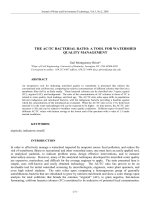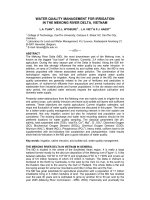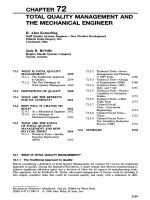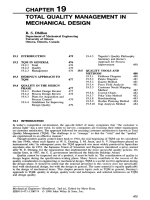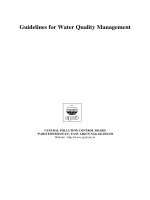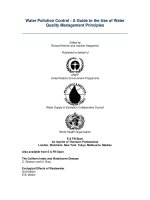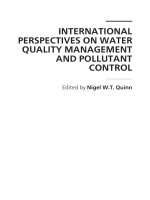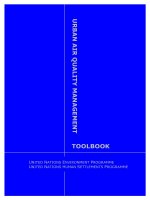Quality management system certification
Bạn đang xem bản rút gọn của tài liệu. Xem và tải ngay bản đầy đủ của tài liệu tại đây (473.05 KB, 8 trang )
Quality Management
System Certification
Understanding Quality Management
System (QMS) certification
BSI Understanding Quality Management System certification
The ISO 13485 standard is an effective solution to meet the comprehensive requirements for
a quality management system (QMS). Adopting ISO 13485 provides a practical foundation
for manufacturers to address the regulations and responsibilities as well as demonstrating a
commitment to the safety and quality of medical devices.
The medical device manufacturing sector is one of the most
regulated sectors in which significant quality systems and
product requirements must be satisfied. The regulatory
requirements are intended to ensure that manufacturers
consistently design, produce, and place onto the market,
medical devices that are safe and fit for their intended
purpose.
What is ISO 13485?
ISO 13485 is a stand-alone QMS standard, derived from the
internationally recognized and accepted ISO 9000 quality
management standard series. ISO 13485 adapts the ISO 9000
process-based model for a regulated medical device manufacturing
environment. While ISO 13485 is based on the ISO 9001 process
model concepts of Plan, Do, Check, Act, it is designed for regulatory
compliance. Thus it is more prescriptive in nature and requires a
more thoroughly documented quality management system.
ISO 13485 was written to support medical device manufacturers in
designing quality management systems that establish and maintain
the effectiveness of their processes. It ensures the consistent design,
development, production, installation, and delivery of medical
devices that are safe for their intended purpose.
BSI's approach to excellence
BSI selects and recruits professionals to conduct ISO 13485
audits. Candidates must have design or manufacturing or process
knowledge and general knowledge on use of medical devices.
Our assessment staff come to BSI with exceptional real industry
experience and then go through rigorous internal training and BSI
qualification processes including best practice quality systems
auditing techniques, understanding critical manufacturing processes,
interpretation of regulatory compliance expectations.
BSI auditors are experts in current state-of-the-art requirements and
are constantly trained on new requirements and future changes, BSI
is always looking forward and ensuring our customers are prepared
and well placed for future regulatory and compliance concerns.
As I look over the 20 years that 3M Unitek and BSI
have worked together, it has been a very satisfying
part of my career. The professional and collegial
atmosphere BSI brings to these audits strongly
encourages us to want to continually improve our
Quality Management System. Please convey my
great appreciation to you and your colleagues for
this.
Jerry Horn, Ph.D. , Manager, Quality & Regulatory 3M Orthodontic Products
Call us now on +44 845 080 9000
High performing organizations expect ISO 13485 auditing to
be thorough, fair, competent, relevant and challenging of the
manufacturers quality management systems, effective auditing
drives significant benefits to the manufacturer.
The beneficial outputs of an effective audit include:
•
Meaningful feedback on the effectiveness of the quality
management system
•
Confidence in compliance with regulations
•
Identification of areas requiring attention
•
Confirmation that best practise is achieved
•
Detection of areas of non-compliance and possible risk
•
Reporting and certification that is valuable and recognized
Risk Management ISO 14971
Risk management is a key component and requirement for
ISO 13485 certification. ISO 14971 is a risk management system
standard, and was designed to be compatible with ISO 13485. It
helps manufacturers meet the increasing global requirements
and expectations to implement not only quality, but full risk
management systems throughout the entire life cycle of the
medical devices they manufacture.
ISO 14971 satisfies the risk management requirement for
IEC 60601-1 for medical electrical equipment and systems. It is
a helpful tool for manufacturers in identifying and controlling
not only the risks associated with their medical devices, but also
evaluating interactions with other devices. Increasingly,
ISO 14971, in the footsteps of ISO 13485, is becoming an
international requirement for medical device manufacturers
to meet regulatory expectations globally.
A medical device manufacturer’s quality management system is the
foundation for maintaining regulatory compliance, driving improvement,
effectiveness and achieving stakeholder confidence in the manufacturer
and their products. The requirements of ISO 13485 provide the model
quality management system building blocks of success.
BSI Excellerator, be the best
BSI Understanding Quality Management System certification
What is BSI Excellerator?
BSI Excellerator is an in-depth report that analyses the way your
management systems are performing. The report is unique to your
company and gives you an invaluable resource with which to measure
your management systems performance.
We use the information from your audit and benchmark this data
against similar organizations – drawing from our extensive audit
database. And because this database is electronic and spans all
industries and organizations of all sizes, we can collate accurate and
detailed information quickly.
What are the benefits?
We provide insight into the management systems in place across
your entire organization as well as how you compare to your sector.
This means we can spot internal and industry trends, combining
performance assessment with an analysis of risks that may hold
you back. And with this knowledge to hand you can make strategic
decisions to prevent and reduce these risks.
You can also make relevant changes based on identified areas of
lower performance – or help higher performing systems to stay that
way. BSI Excellerator maps out clear paths for improvement, even if
you are doing well, and shows you how you can do even better.
For more information about
how BSI exellerator improve
performance visit:
bsigroup.co.uk/excellerator
medicaldevices.bsigroup.com
Call us now on +44 845 080 9000
ISO 13485 is the best internationally-accepted model a medical
device organization can implement to help demonstrate
compliance to laws and regulations of the medical device industry.
ISO 13485 is the quality management system standard accepted
as the basis for CE marking medical devices under European
Directives. Increasingly, ISO 13485 is being required, or is at least
beneficial, in supporting regulations around the world, including
the Health Canada Canadian Medical Device Regulations
CMDCAS programme.
Although ISO 13485 certification is not a direct requirement
for CE marking medical devices under the European Medical
Device Directives, it is recognized as a harmonized standard
by the European Commission. Therefore compliance with ISO
13485 provides a presumption of conformity with the basic
European Union (EU) quality assurance requirements for CE
marking (additional EU requirements apply). BSI, as one of the
leading Notified Bodies for CE marking, can help guide medical
device manufacturers on selecting the most efficient conformity
assessment routes to achieve CE marking.
When it comes to medical device manufacturing,
patient safety greatly depends on the quality and
consistency of medical products.
ISO 13485 is important to designers, manufacturers, and
distributors of medical devices. In addition, suppliers and service
providers can enhance an organization's marketability as more and
more manufacturers require certification in order to do business
with a vendor.
When it comes to medical device manufacturing, patient safety
greatly depends on the quality and consistency of medical products,
and ensuring effectiveness, control and maintenance of your quality
management system is critical to customers, stakeholders, patients
and users, and regulatory agencies.
The value of ISO 13485 is not just in the implementation, but also in
providing a tool for a thorough audit to test the effectiveness of the
system. It provides the manufacturer a higher level of confidence
in the ability to consistently achieve and maintain compliance with
regulatory requirements. Also it can help to minimize surprises and
failures which might adversely affect patient safety and damage a
manufacturer's reputation.
The importance of ISO 13485
ISO 13485 and CE marking
BSI Understanding Quality Management System certification
Call us now on +44 845 080 9000
BSI offer you excellence locally
Worldwide QMS assessors
BSI's experience
Whether a medical device manufacturer is a single site, a
one-person start up or a multinational corporation, a BSI
ISO 13485 certification indicates to all stakeholders that a
medical device manufacturer is not looking for short-cuts
or easy routes to market, but, that they are a manufacturer
fully committed to quality and compliance with regulatory
requirements.
There is more concern today than ever about the integrity
and regulatory value of ISO 13485 certifications. A BSI ISO
Certification stands up to regulatory scrutiny, has broad
recognition and a high reputation consistent with the high
demands of the industry leaders who select to be certified
by BSI.
BSI ISO 13485 Certification is one component of
the comprehensive portfolio of quality management
assurance services that BSI provides medical device
manufacturers, services that include quality and regulatory
training, Entropy software solution, CE marking, CMDCAS
certification and FDA inspections under the AP programme.
Textiles and Man
Made Fibres
Sterile Packaging
Software
Rubber and
Plastics
Packaging
Organics
Microbiology
and Sterilization
Medicinal Substances
Metals
IVD - Reagents
and Calibrators
IVD - Instruments
and Meters
Chemical
Processes
Animal Tissues
Active Implantable
Medical Devices
Active / Electro-medical
BSI's
experience
Americas 66
Asia Pacific 36
Europe 49
BSI Understanding Quality Management System certification
medicaldevices.bsigroup.com
Call us now on +44 845 080 9000
Your path to certification
BSI provides a full range of services to support your path to certification. BSI's business development
staff can help you and your organization understand each phase of the assessment and certification
process to ensure you fully understand the ISO 13485 certification process and its available guidelines.
We provide training courses that can help you develop a thorough understanding of the complexities of
complying with the standard, as well as the laws and regulations the standard helps to address.
Get top management involved
Top management involvement is a requirement for ISO 13485
and must be clearly demonstrated by providing evidence of
its commitment to the standard by determining customer
requirements, establishing a quality policy, and ensuring
relevant, useful, and measurable objectives, as well as focusing
on responsibility, representation, communication, and review of
medical devices.
Adopt the process model
Rather than focusing on each individual clause of the standard,
read the requirements in terms of inputs and outputs. ISO 13485
uses the Plan, Do, Check, Act methodology, and each key area of
the standard, such as quality system, management responsibility,
resource management, product realization, and measurement,
must be read in terms of inputs to the requirement (i.e., resource
requirements) and outputs to the requirement (i.e., measurements).
Only through careful study and understanding of the process
model can you achieve this effective thinking approach.
Important questions to consider for inputs are:
•
Who does this process?
•
How are they trained?
•
What records are kept?
Important questions to consider for outputs are:
•
How are customer concerns captured?
•
How are regulatory requirements met?
•
How are they summarized?
•
Who receives the summary report?
•
What metrics are outputs of the process?
•
How are these reviewed or monitored?
BSI Understanding Quality Management System certification
Once a medical device quality management system has been
developed and implemented, a BSI Client Manager can conduct
a fair and thorough assessment of the system against the
requirements. Upon satisfactory completion, BSI will issue a
certificate to the standard which you can then use to promote your
business and products as an objective, accredited, and globally-
recognized evidence of your company's commitment to quality
systems and maintaining patient safety.
Key activities for ISO 13485
Want to compare
your results to the
industry average?
BSI Excellerator
can help.
Call us now on +44 845 080 9000
When an organization adopts ISO 13485, it commits to
establishing, documenting, implementing, and maintaining a
quality management system, which includes a commitment
to an effective internal audit program. There are four steps to
conducting a complete and effective internal audit.
Plan
Planning is an important component to the ISO 13485 standard.
Organizations must consider product realization, ISO 13485
in its entirety, and quality management system requirements
established by the organization. This is in addition to all of the
activities related to the product, such as planning of the product,
customer requirements, design, purchasing, production, storage,
and measuring, and any additional requirements.
Conduct
Conducting internal audits is one of the biggest areas of non-
conformity seen in support of the ongoing process over time.
As costs rise and enthusiasm for an effective system fades,
organizations begin to falter. However, in order to maintain an
effective quality management system, an organization must press
on and conduct its internal audit plan.
Measure
Once an internal audit is conducted, the results are reported, and
actions to correct deficiencies must be processed immediately
and any causes for nonconformities must be eliminated.
Questions to consider are:
•
Have deficiencies been corrected?
•
Were they corrected effectively and in a timely manner?
•
Were the causes well understood and eliminated?
•
Were there any trends noted in the process or in the product?
Correct
The final step in conducting an effective internal audit is focusing
on understanding and measuring the effectiveness of the actions
taken, and understanding and measuring the effectiveness of the
internal audit process.
Questions to consider here are:
•
Do we need more people?
•
Do we have the right people?
•
Are the people trained effectively?
•
Are we seeing and understanding the right areas of the
organization to detect and see the corrections that will make
our devices safer and prevent defects from getting on the
market?
BSI Understanding Quality Management System certification
Conducting an internal audit
medicaldevices.bsigroup.com
Call us now on +44 845 080 9000
© BSI Group BSI/UK1689/MD/0713/en/BLD
Your partner in worldwide compliance: Call BSI today on +44 845 080 9000
or visit medicaldevices.bsigroup.com – to start your partnership
BSI Group - Netherlands
Adam Smith Building
T.R.Malthustraat 3c
Amsterdam
1066 JR
The Netherlands
T: +31 (0)20 346 0780
F: +31 (0)20 346 0781
E:
BSI Group - EMEA
Kitemark Court,
Davy Avenue,
Knowlhill,
Milton Keynes MK5 8PP
United Kingdom
T: +44 (0)845 080 9000
F: +44 (0)1908 814920
E:
BSI Group America Inc.
12110 Sunset Hills Road,
Suite 200
Reston,
VA 20190-5902
USA
T: +1 800 862 4977/703 437 9000
F: +1 703 437 9001
E:
BSI Group Canada Inc.
6205B Airport Rd,
Suite 414
Mississauga,
ONL4V 1E3
Canada
T: +1 800 862 6752/416 620 9991
F: +1 416 620 9911
E:
BSI Group Asia Pac
BSI - Singapore
460 Alexandra Road
# 08-01/01, PSA building
Singapore 119963
T: +65 627 00777
F: +65 627 02777
E:
Visit us online at: medicaldevices.bsigroup.com
BSI Group - Germany
BSI Group Deutschland GmbH
Eastgate
Hanauer Landstraße 115
60314 Frankfurt
Germany
T: +49 (0)69 2222 89 200
F: +49 (0)69 2222 89 300
E:
The trademarks in this material (for example the BSI logo
or the word “KITEMARK”) are registered and unregistered
trademarks owned by The British Standards Institution in
United Kingdom and certain other countries throughout
the world.
Talk to BSI
We believe excellence should follow in
everything we do, so if you would like to find
out more about BSI QMS solutions, please
call or email us for an initial conversation
ISO 13485 training courses
Introduction to ISO 13485 Medical Devices
BSI’s Introduction to ISO 13485 course provides an insight into the
use of ISO 13485 as the basis for a Quality Management System
implemented by medical device manufacturers. Time is spent
reviewing the requirements of ISO 13485 and making comparisons
to ISO 9001 and the FDA’s Quality System Regulation. Participants
will also gain an awareness of the relationship between ISO 13485
and ISO 14971, Risk Management to Medical Devices.
Course duration: 1 day
Implementing ISO 13485 Medical Devices
BSI’s Implementing ISO 13485 course provides you with the
knowledge and process steps to effectively implement a Quality
Management System in line with the requirements for ISO 13485
certification. The course introduces the concepts needed to
understand, develop, and implement a quality management system.
Course duration: 2 days
Internal Auditor ISO 13485 Medical Devices
BSI’s Internal Auditor ISO 13485 course is intended for medical
device quality professionals aiming to build on their current
knowledge of ISO 13485 and evaluate the effectiveness of the quality
management system in their organization. This intensive course
teaches the principles and practices of effective quality management
systems process audits in accordance with the ISO 13485 and ISO
19011. “Guidelines for Quality and/or Environmental Management
Systems Auditing.” The tutor guides students through the internal
audit process, from planning an audit to reporting on audit results
and following up on corrective actions.
Course duration: 2 days
Lead Auditor ISO 13485 Medical Devices
BSI’s Lead Auditor ISO 13485 course teaches the principles and
practices of effective quality management systems and process
audits in accordance with ISO 13485 and ISO 19011. Tutors guide
students through the entire audit process, from managing an audit
programme to reporting on audit results.
Course duration: 5 days
